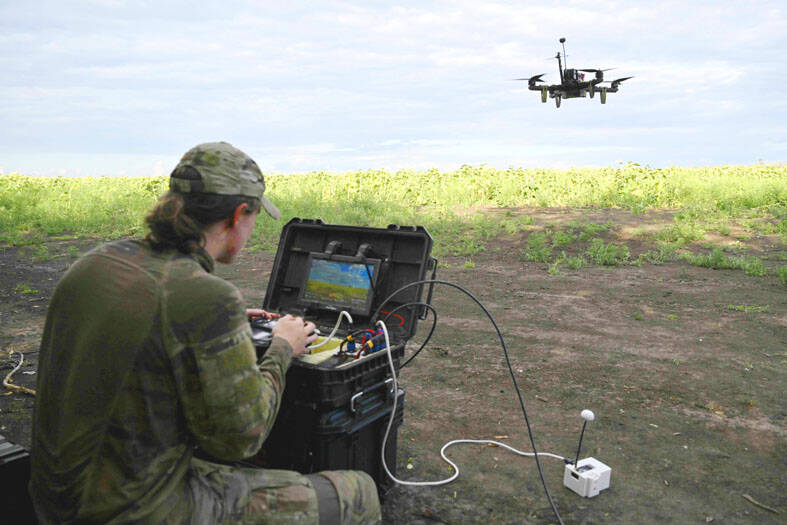Rubik, a Ukrainian military drone pilot, had tracked the every move of one particular Russian soldier for weeks, with the promise of earning at least six points for killing him.
In a war increasingly dominated by drones, Ukraine’s military has launched a new score-based purchasing system for units to replenish their stocks, and Rubik — his military nickname — was looking to help his brigade cash in.
On the “Brave1” platform launched by Ukraine’s Ministry of Digital Transformation, new drones for the troops fighting Russia’s invasion go for between two and a few dozen points.

Photo: AFP
“You get the most points for infantry, so everyone is focusing on destroying manpower,” the 22-year-old said at a bombed-out school in eastern Ukraine being used by his reconnaissance group of the 3rd Army Corps.
The Brave1 market has been dubbed by its creators the world’s first military Amazon, because it allows brigades to choose their weapons and leave reviews.
“It’s complete decentralization,” platform head Andriy Hrytseniuk said, adding that the system promotes “healthy competition” not only between Ukrainian army drone units, but also between producers to make the best weapons.
Many servicemen in Rubik’s unit were about his age, from a generation raised on gaming and smartphones, making the transition to drone piloting easy.
They are driving an overhaul in conventional warfare, where trenches and artillery are being replaced by a canopy of cheap, but deadly drones blanketing the front line, crashing directly into targets or dropping munitions.
Pilots, who steer the drone with controllers via a monitor, upload recordings of their kills to Brave1. They are then verified by the platform and converted to points.
The Brave1 program is part of a broader trend in which tech is influencing how war is waged, Swedish Defence University associate professor Matthew Ford said.
“Instead of having a planned process of managing supply down to the front lines, this is demand-led,” Ford said.
The initiative is supervised by the digital transformation ministry, a driving force in the modernization of the Ukrainian army, which has been criticized for its Soviet-style hierarchy and rigidity.
Brave1 coordinators can easily increase the points for different Russian targets according to specific threats along different areas, optimizing the army’s versatility.
However, Ukrainian servicemen said that the program is not a replacement for centralized weapons or ammunition deliveries or orders from above.
“Our mission always comes first — not points or ratings,” said Foma, an officer in the Achilles regiment who also identified himself by his military nickname.
Although they serve under a unified command, Ukrainian brigades cultivate separate identities to attract recruits and funding.
Brave1 fuels that competition by publishing a league table each month of the 10 highest-scoring brigades.
Lafayette, 37, a drone pilot in Achilles, said he was immensely proud his regiment featured on the latest league board.
However, he said he understood how the gamification of killing could make civilians uncomfortable.
“When I try to switch back to a civilian mindset and think about it, it’s a bit cringe. It stings a little,” he said.
The pilots also have an unusually intimate view of the horrors playing out on a battlefield where drones account for a majority of casualties.
Rubik recounted following the Russian infantryman for weeks and hearing details of his personal life on radio intercepts.
“We killed him. My soul felt a bit empty,” Rubik said, adding that he had not lost sight of what was at stake for his country — or the points the hit would win for his unit.
“If people were in our shoes, they’d understand what it’s all about. There is war in our country. There can’t be any mercy,” he said.

Australia has announced an agreement with the tiny Pacific nation Nauru enabling it to send hundreds of immigrants to the barren island. The deal affects more than 220 immigrants in Australia, including some convicted of serious crimes. Australian Minister of Home Affairs Tony Burke signed the memorandum of understanding on a visit to Nauru, the government said in a statement on Friday. “It contains undertakings for the proper treatment and long-term residence of people who have no legal right to stay in Australia, to be received in Nauru,” it said. “Australia will provide funding to underpin this arrangement and support Nauru’s long-term economic

ANGER: Unrest worsened after a taxi driver was killed by a police vehicle on Thursday, as protesters set alight government buildings across the nation Protests worsened overnight across major cities of Indonesia, far beyond the capital, Jakarta, as demonstrators defied Indonesian President Prabowo Subianto’s call for calm. The most serious unrest was seen in the eastern city of Makassar, while protests also unfolded in Bandung, Surabaya, Solo and Yogyakarta. By yesterday morning, crowds had dispersed in Jakarta. Troops patrolled the streets with tactical vehicles and helped civilians clear trash, although smoke was still rising in various protest sites. Three people died and five were injured in Makassar when protesters set fire to the regional parliament building during a plenary session on Friday evening, according to

‘NEO-NAZIS’: A minister described the rally as ‘spreading hate’ and ‘dividing our communities,’ adding that it had been organized and promoted by far-right groups Thousands of Australians joined anti-immigration rallies across the country yesterday that the center-left government condemned, saying they sought to spread hate and were linked to neo-Nazis. “March for Australia” rallies against immigration were held in Sydney, and other state capitals and regional centers, according to the group’s Web site. “Mass migration has torn at the bonds that held our communities together,” the Web site said. The group posted on X on Saturday that the rallies aimed to do “what the mainstream politicians never have the courage to do: demand an end to mass immigration.” The group also said it was concerned about culture,

CRACKDOWN: The Indonesian president vowed to clamp down on ‘treason and terrorism,’ while acceding to some protest demands to revoke lawmaker benefits Protests in Indonesia over rising living costs and inequality intensified overnight, prompting Indonesian President Prabowo Subianto to cancel a planned trip to China, while demonstrators reportedly targeted the homes of the finance minister and several lawmakers. Rioters entered Indonesian Minister of Finance Sri Mulyani Indrawati’s residence near Jakarta early yesterday, but were repelled by armed forces personnel, Kompas reported. Items were taken from the homes of lawmaker Ahmad Sahroni and two others, according to Detik.com. The reports of looting could not be independently verified, and the finance ministry has not responded to requests for comment. The protests were sparked by outrage over